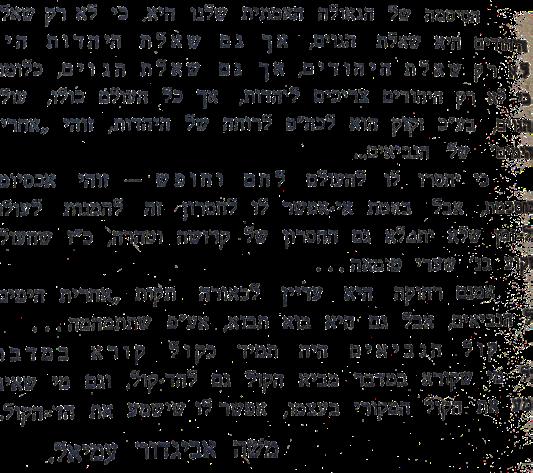
1 minute read
A Neglected Prayer
Rabbi Dr. Abraham J. Twerski zt”l
Rabbi Dr. Abraham J. Twerski zt”l, one of the most beloved leaders of our generation, was both an eminent psychiatrist and a Torah scholar who used psychological insights that enhanced application of Torah principles to everyday life. Founder of the Gateway Rehabilitation Center in Pennsylvania, the author of more than 60 books, and a regular contributor to HaMizrachi magazine, he lectured extensively on the topics of chemical dependency, stress, self-esteem and spirituality. We will observe his second yahrzeit on the 18th of Shevat. May his memory be a blessing for all of Am Yisrael.
Advertisement
What we pray for is a good indication of how important things are to us. We pray for long life, good health, parnassah, and nachat from our children. The intensity of our prayers reflects the degree of their importance. Nothing equals the intensity of our prayers for life and health, because without these, whatever else we have pales in comparison.
In the more comprehensive siddurim, there is an introductory prayer attributed to Rebbe Elimelech of Lizhensk, one of the foremost Chassidic masters. As in other prayers, we pray for forgiveness of our sins, for Divine guidance, for good judgment, and for freedom from the enticement of the yetzer hara, the inclination to indulge in animalistic behavior. But there is one request not found anywhere else, to the best of my knowledge. We ask G-d to “help us to see the merits in our fellow humans and not their faults.”
It is not uncommon for some people to be critical of others, but is far less common to praise others. Seeing faults in other people is likely to be defensive. It is a way to bolster one’s own sagging self-esteem.
The Talmud says that the faults we see in others are actually our own faults. The Ba’al Shem Tov once happened to see a Jew violating Shabbat. True to his own belief, he felt that he must himself be guilty of having violated Shabbat, else he would not have noticed it. When a thorough soul-searching failed to reveal where he had violated Shabbat, he prayed for Divine enlightenment. It was revealed to him that he had once heard the defamation of a Torah scholar. Inasmuch as the Zohar says that a Torah scholar possesses the holiness of Shabbat, this was tantamount to a violation of Shabbat.
Before being critical of another person’s behavior, think of your own defects. The Ba’al Shem Tov said that the world is a mirror. As we are generally blind to our own shortcomings, G-d arranges that we should see them in others, and we should realize that we must correct our own faults. The next time you wish to say something negative about someone, pause and think. You might be revealing your own shortcomings.







